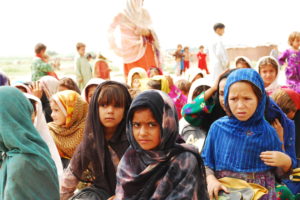Afghan refugees between a rock and hard place
Afghan refugees pressured by Pakistan to return to their strife-riven homeland face violence, hunger and homelessness, according to NGOs working in the region.
The United Nation High Commission for Refugees (UNHCR) says more than 600,000 Afghans returned last year from Pakistan, where rights groups have documented campaigns of harassment by the authorities.
Pakistan suspended its forced repatriation policy in December but resumed it recently and advocates say harassment is on the rise again.
 The UN says a similar number of returnees this year would further strain the capacity of the Afghan government, which is already unable to deal with those who came back in 2016.
The UN says a similar number of returnees this year would further strain the capacity of the Afghan government, which is already unable to deal with those who came back in 2016.
At the same time, the UN says, a record 400,000 people were displaced by war inside Afghanistan last year.
A recent UN survey found that 46 percent of returnees around the capital, Kabul, were experiencing food insecurity.
The figure was 30 percent in Nangarhar, a province bordering Pakistan. Of those surveyed in both locations, 63 percent listed employment as a “priority need”.
And exacerbating factor is that many returnees have no home to return to. Land would not only give them somewhere to build a house; it would also allow them to farm, which would cut down on hunger and unemployment.
A land distribution program launched in Afghanistan has so far made little progress.
The government gives each returnee $US50, while the UNHCR provides registered refugees with another $US200.
But the money disappears quickly with rent for houses costing of $75 to $100 a month.
The government and humanitarian agencies have asked for $550 million to fund program in 2017 but so far only 21 per cent of that has been committed or delivered.
“As aid agencies there is only so much we can do with the budgets and resources we’re given,” said Mohammad Nader Farhad, a spokesman for UNHCR.
“There are some institutional matters that different ministries of the Afghan government will have to work on as well,” he said
The inability of ministries to coordinate and provide long-term solutions, such as land distribution, has been an issue for the Afghan government for years.
Last year, Amnesty International reported that the government had failed to implement a national policy to provide basic living conditions for displaced people. Amnesty found many were living “on the brink of survival”.
The situation has since worsened with record numbers of both returning refugees and people displaced by fighting.
As Pakistan ramps up its repatriation efforts and as the war in Afghanistan intensifies, things could get more desperate.
There are still more than two million Afghan refugees in Pakistan, about half of whom Pakistan has refused to register officially.
Although Pakistani officials have denied that authorities were purposefully harassing Afghan refugees, reports of harassment have become commonplace.
Laurie Nowell
AMES Australia Senior Journalist












